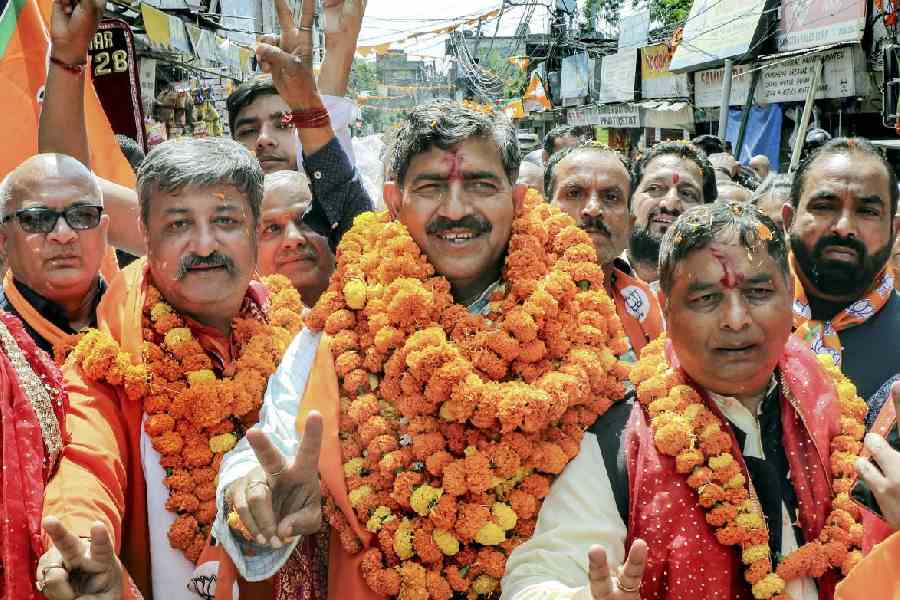Labha Ram Gandhi is an unlikely voice advocating a bar on outsiders from purchasing land or landing government jobs in Jammu and Kashmir — a reminder of how the Sangh parivar’s “complete integration” theory is facing a challenge in Jammu, one of its oldest bastions.
Gandhi is president of an organisation representing Pakistani refugees, the ubiquitous “outsiders” of Jammu, who waged a battle for equal rights with locals for seven long decades until 2019 when they had the last laugh with the reading down of Articles 370 and 35A.
Owing gratitude to the BJP, his organisation has decided to vote for the party. But like many others in Jammu, he is unwilling to extend that privilege to Indians from other states looking for such rights here.
“I want that door closed for outsiders,” Gandhi, an outsider-turned-local, told The Telegraph, putting the number of “West Pakistan refugee” voters at 1.25 lakh.
The Jammu Lok Sabha seat has 17.81 lakh voters, a fifth of them minorities.
The top BJP leadership, including Narendra Modi, Amit Shah, Rajnath Singh and Yogi Adityanath, have in election rallies across the region’s two Lok Sabha seats — Jammu and Udhampur — magnified the virtues of scrapping the region’s special status.
The move has opened lands and government jobs in J&K to outsiders along with ridding the state of its statehood, flag, constitution and penal code. BJP leaders call it a full integration of the erstwhile state with the country.
The seeds for change were sown in Jammu soon after Partition with Syama Prasad Mookerjee, founder of the Jana Sangh, the precursor of the BJP, seeking in 1953 “complete” integration of Kashmir with the rallying cry ‘Ek Desh Mein Do Vidhan, Do Pradhan aur Do Nishan Nahin Chalenge (One country can’t have two Constitutions, two Prime Ministers and two flags)’.
Mookerjee, who was jailed by the government of Sheikh Mohammad Abdullah, the then Prime Minister of Kashmir, soon after, died in June 1953, triggering protests and setting the tone for the scrapping of Article 370. Mookerjee’s idea finally won in 2019, when Kashmir lost its special status and was reduced to a Union territory.
That perhaps explains why the contest in Jammu region, the first major election after 2019, is seen by many as a referendum on the momentous decision. The region’s Hindu majority, mostly Dogras, had celebrated the changes. The BJP has erected strong symbols of nationalism, including statues of Mookerjee and the last Dogra ruler, Maharaja Hari Singh, at multiple places. Hari Singh’s birthday was declared a holiday.
But the fear of losing out to outsiders is palpable.
“We want an extension of Article 371 here and outsiders should not get jobs here, nor (other) facilities. It should continue the way it was before Article 370. That will lead to development of Jammu and Kashmir. If outsiders, investors come here, it will be a loss,” Gandhi, whose parents migrated from Sialkot in Pakistan to Jammu in 1947, told The Telegraph.
“You look at how many thefts are taking place here and how things are going bad. Who is doing it? It is the people from outside,” he adds. “Earlier they would come here but they can now become domiciles. Even (non-local) IAS, IPS officers could not become domiciled after retirement and would go back to their parent states. Now the door has been opened for them, this is a loss for Jammu and Kashmir.”
The West Pakistan refugees had chosen to migrate to Jammu, rather than Punjab, due to connectivity between Sialkot and Jammu via the Sialkot Railway link and road. Gandhi said that many
occupied houses of Muslims in the villages after they migrated to the other side.
Though the BJP can bank on their support, their enthusiasm is not shared by sections of Dogras who feel increasingly choked by the changes. They fear a threat to their cherished Dogra identity, with outsiders taking away their jobs and land.
Some influential Dogra voices are even calling for the restoration of Article 370.
Vikram Singh Chib, the president of Yuva Rajput Sabha, a prominent Dogra group, said Article 370 was a gift to the people from their ancestors — the erstwhile Dogra rulers. Hari Singh had acceded three subjects of communication: currency, defence and foreign affairs.
“They must have the interests of locals in mind,” he said.
So do they support the restoration of Article 370?
“Obviously we want it back,” he said.
Congress candidates are trying to cash in on this anger. Many believe it will be a close contest, unlike 2019 when BJP candidates trounced the Opposition by big margins in both constituencies.
“Who is happy? You move around and you will find that people are unhappy. You snatched our post of governor, downgraded us to UT, will we still be happy?” the Congress candidate for Jammu, Raman Bhalla, tells this newspaper at Kotli Arjun Singh, a predominantly Sikh village in RS Pora.
The BJP is, however, banking heavily on the Modi factor and the party’s aggressive Hindutva.
A first-time voter from neighbouring Miran Sahib said she would vote for the BJP. “They gave us our Ram Mandir back. Who else could do it?”
“With 370 gone, 35A gone, Ram Mandir built and Pran Pratishtha of Ram Lalla done, people are happy and want Narendra Modiji back at the helm,” says BJP candidate Jugal Kishore.
Jammu votes today










